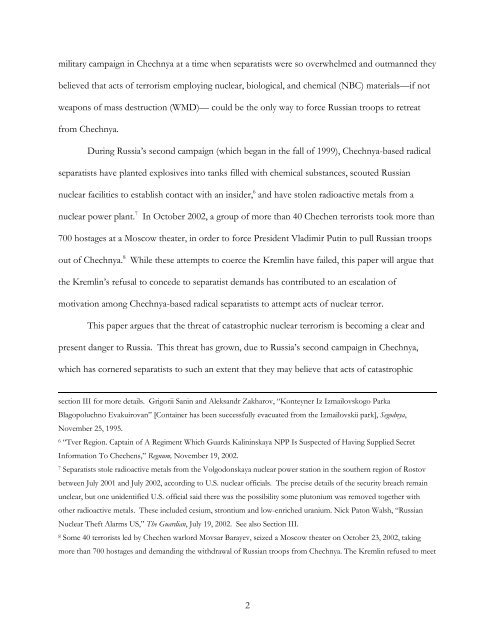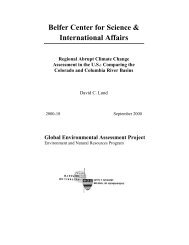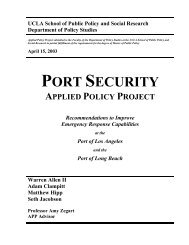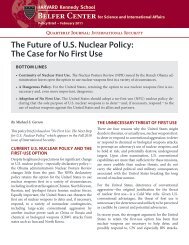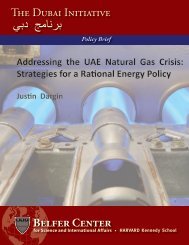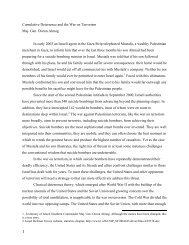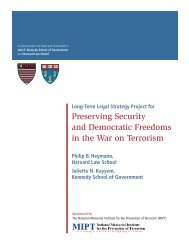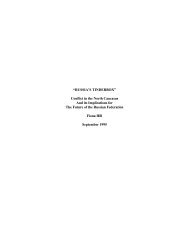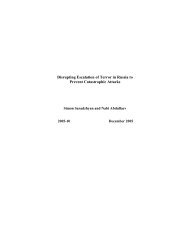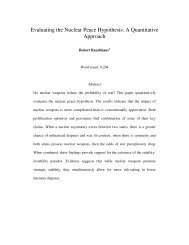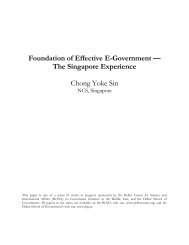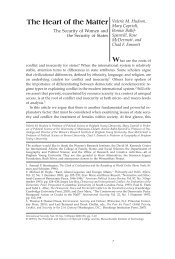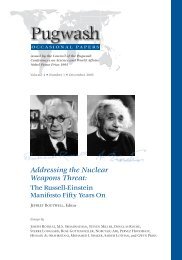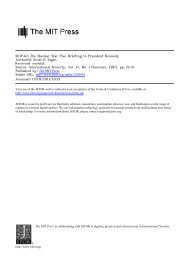Russia - Belfer Center for Science and International Affairs - Harvard ...
Russia - Belfer Center for Science and International Affairs - Harvard ...
Russia - Belfer Center for Science and International Affairs - Harvard ...
Create successful ePaper yourself
Turn your PDF publications into a flip-book with our unique Google optimized e-Paper software.
military campaign in Chechnya at a time when separatists were so overwhelmed <strong>and</strong> outmanned they<br />
believed that acts of terrorism employing nuclear, biological, <strong>and</strong> chemical (NBC) materials—if not<br />
weapons of mass destruction (WMD)— could be the only way to <strong>for</strong>ce <strong>Russia</strong>n troops to retreat<br />
from Chechnya.<br />
During <strong>Russia</strong>’s second campaign (which began in the fall of 1999), Chechnya-based radical<br />
separatists have planted explosives into tanks filled with chemical substances, scouted <strong>Russia</strong>n<br />
nuclear facilities to establish contact with an insider, 6 <strong>and</strong> have stolen radioactive metals from a<br />
nuclear power plant. 7 In October 2002, a group of more than 40 Chechen terrorists took more than<br />
700 hostages at a Moscow theater, in order to <strong>for</strong>ce President Vladimir Putin to pull <strong>Russia</strong>n troops<br />
out of Chechnya. 8 While these attempts to coerce the Kremlin have failed, this paper will argue that<br />
the Kremlin’s refusal to concede to separatist dem<strong>and</strong>s has contributed to an escalation of<br />
motivation among Chechnya-based radical separatists to attempt acts of nuclear terror.<br />
This paper argues that the threat of catastrophic nuclear terrorism is becoming a clear <strong>and</strong><br />
present danger to <strong>Russia</strong>. This threat has grown, due to <strong>Russia</strong>’s second campaign in Chechnya,<br />
which has cornered separatists to such an extent that they may believe that acts of catastrophic<br />
section III <strong>for</strong> more details. Grigorii Sanin <strong>and</strong> Aleks<strong>and</strong>r Zakharov, “Konteyner Iz Izmailovskogo Parka<br />
Blagopoluchno Evakuirovan” [Container has been successfully evacuated from the Izmailovskii park], Segodnya,<br />
November 25, 1995.<br />
6 “Tver Region. Captain of A Regiment Which Guards Kalininskaya NPP Is Suspected of Having Supplied Secret<br />
In<strong>for</strong>mation To Chechens,” Regnum, November 19, 2002.<br />
7 Separatists stole radioactive metals from the Volgodonskaya nuclear power station in the southern region of Rostov<br />
between July 2001 <strong>and</strong> July 2002, according to U.S. nuclear officials. The precise details of the security breach remain<br />
unclear, but one unidentified U.S. official said there was the possibility some plutonium was removed together with<br />
other radioactive metals. These included cesium, strontium <strong>and</strong> low-enriched uranium. Nick Paton Walsh, “<strong>Russia</strong>n<br />
Nuclear Theft Alarms US,” The Guardian, July 19, 2002. See also Section III.<br />
8 Some 40 terrorists led by Chechen warlord Movsar Barayev, seized a Moscow theater on October 23, 2002, taking<br />
more than 700 hostages <strong>and</strong> dem<strong>and</strong>ing the withdrawal of <strong>Russia</strong>n troops from Chechnya. The Kremlin refused to meet<br />
2


